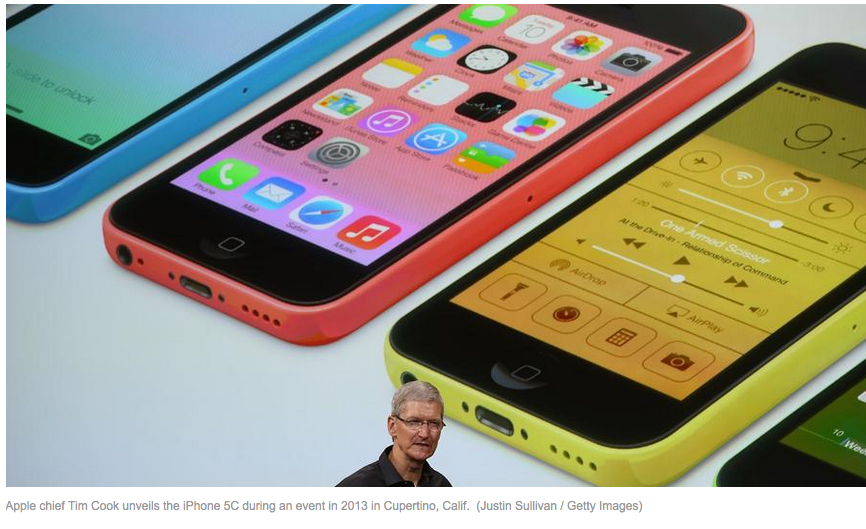Authorities investigating the shooting in San Bernardino that killed 14 people in December — the deadliest terrorist attack in the U.S. since 9/11 — recovered three cellphones belonging to the assailants. Two of them had been destroyed, while a third one found in the shooters’ vehicle was locked by a short, numeric passcode.
The FBI wants to hack into that Apple iPhone 5C, which was shooter Syed Rizwan Farook’s work phone from the San Bernardino County Department of Health. Farook and his wife, Tashfeen Malik, died in a firefight with police hours after the attack.
Authorities and Apple Inc. held discussions for about a month about ways to unlock the device, coming up with no amicable solution.
It is the tech giant’s policy to require law enforcement to obtain search warrants or subpoenas before aiding in investigations. That prompted the FBI to seek a court order requiring Apple’s assistance, which a U.S. magistrate granted Tuesday.
Apple Chief Executive Tim Cook’s public vow to fight the order set off a worldwide debate about whether technology providers should be able to protect users’ data so securely that law enforcement is effectively shut out from ever getting it. Senior Apple executives underscored Friday that they have no intention of backing down. Federal prosecutors and Apple also separately disclosed new details about what transpired privately in the weeks leading up to their very public legal battle this week.
Here’s a look at some of the key points in the battle.
Apple’s software deters the FBI from attempting to guess Farook’s passcode.
The FBI potentially has only 10 guesses before the phone’s contents self-destruct, and time delays are imposed between incorrect guesses to discourage rapid-fire attempts.
Adding to the FBI’s problems is that Apple is judge, jury and executioner when deciding what software runs on an iPhone: An app or program won’t work without a special signature from Apple.
The set-up is aimed at stopping viruses or malware from infecting iPhones, and it also gives Apple latitude to ban apps it doesn’t want to support, including for competitive or cultural reasons. This hinders the FBI from developing its own tool to get around the passcode issues.
The FBI wants a way to easily guess Farook’s passcode.
This week’s court order requires the FBI and Apple to work in tandem to develop software that preserves the data on Farook’s phone while allowing an app devised by the FBI to input an unlimited number of passcodes until it guesses the right one.
It marks the first time Apple has been ordered to develop software that would allow authorities to circumvent the passcode on an encrypted phone. (Read the full story: Apple CEO says helping FBI hack into terrorist’s iPhone would be ‘too dangerous’)
Generating the new software for the FBI wouldn’t be trivial, but it’s certainly doable, experts said.
The code would get rid of the barriers that normally arise when someone tries too many times to guess a user’s passcode. And it would have to include a funnel for automated guessing, freeing the FBI from manually entering potentially tens of thousands of numeric combinations.
Source: Los Angeles Times staff, http://www.latimes.com
 Listen Online
Listen Online Watch Online
Watch Online Find a Station in Your Area
Find a Station in Your Area







 Listen Now
Listen Now Watch Online
Watch Online
